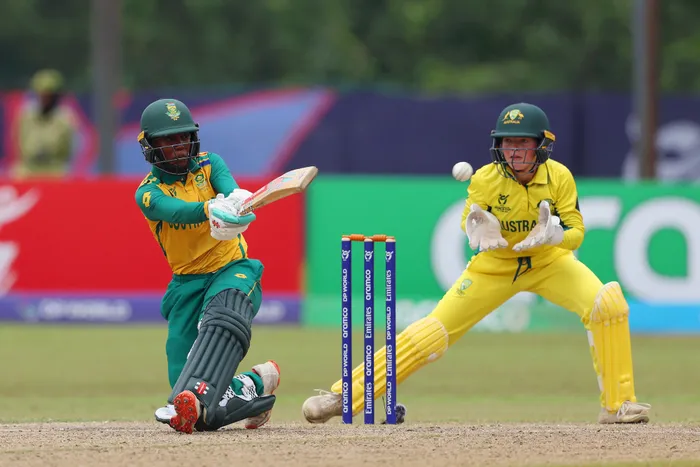
Karabo Meso of South Africa batting against Australia during the ICC Women's U19 T20 World Cup in January. | Getty Images via ICC
Image: Getty Images
AT times, the excitement of the country when a prodigious youngster makes waves in domestic cricket could spell the end of a senior player’s career.
The fans can be quick to forget what the senior player has done for the country in the past and be swallowed by the endless possibilities that a young cricketer brings with their rise.
The same happened when the 17-year-old wicket-keeper batter Karabo Meso showcased her talents in provincial cricket. While the youngster was scoring centuries for fun in high school, many were already earmarking Meso to succeed Sinalo Jafta in the Proteas Women’s squad.
Following Lizelle Lee’s retirement, Jafta took over as the main wicket-keeper, but lacked the batting pedigree that Lee had during her time.
As a result, when Meso showed far better batting abilities than Jafta, many believed that Jafta’s days in the Proteas Women’s team were numbered.
However, that is not how the two players’ fate has played out. The current Proteas women’s management has found a way to rotate the two players, a decision that takes into account Meso’s inexperience and Jafta’s natural-born ability to be a suitable mentor to Meso.
In an exclusive interview with Independent Media, Meso emphasised that she does not see Jafta as a rival, like many did during her rise.
Instead, the youngster highlighted that Jafta has shown her the ropes of international cricket and has been an example for her since breaking into the senior women’s team.
“We are not rivals. We learn from each other. I learn a lot from her. She probably does learn from me. We have a good relationship with SJ. I just don't see a competition there because I know why I'm in the team,” Meso told Independent Media.
“SJ and I, we're really close. Since I got on the team, I look up to her on and off the field. She's a really good person, so I wouldn't say I compete with her, because I'm on my own journey, and she's still on her own journey.
“That's what I'm saying about expectation. People want you to do things at a certain time, forgetting that things take time and that people are different, too. You could score 100 now at the age of 14, and I could score 100 at the age of 25, which is totally fine.”
Meso, alongside other youngsters including Miane Smit, Ayanda Hlubi and Annerie Dercksen, seem to have acclimatised to international cricket a lot quicker.
Even senior player Masabata Klaas highlighted how the youngsters are now coming into the senior team looking crisper.
The professionalisation of women’s domestic cricket has also played a hand in accelerating the growth of players, closing the gap between domestic cricket and international cricket.
Meso highlighted that it was Dinesha Devnarain, the Proteas Women’s Under-19 coach, who drilled into them the message of acting and living like a professional cricketer.
“I’ll say I got taught that in being professional at the 2023, the first World Cup, the Under-19 World Cup, I was still 15 there. It's a bit crazy, I'll put it that way, to show a 15-year-old how to behave in this space.
“I got used to it because Coach D has that thing for us, where she reminded us that we need to act professionally, cricket-wise, to know our games. I think it also helped me.
“When I'm with the Proteas team, it's just like Masabata said, we act more professionally because we're used to that. It's not a big thing.”
Meso is one of the youngsters who are likely to travel to India and Sri Lanka for the ODI World Cup next month.